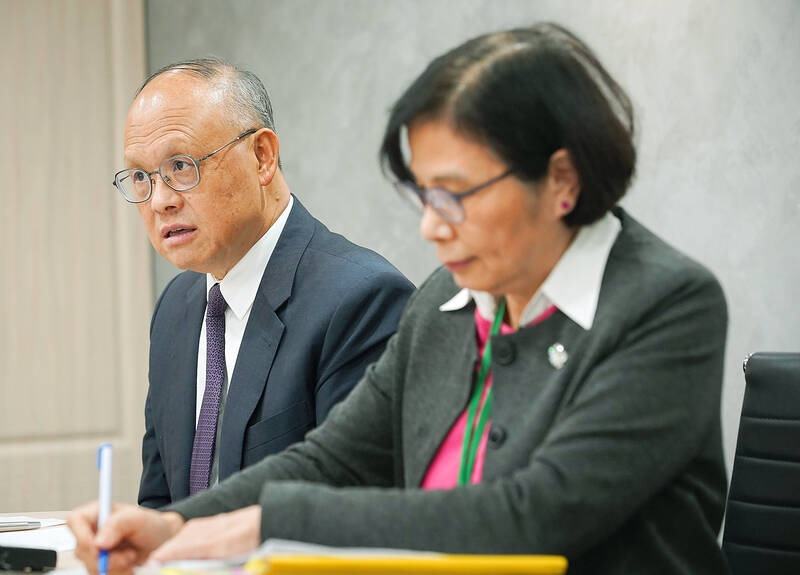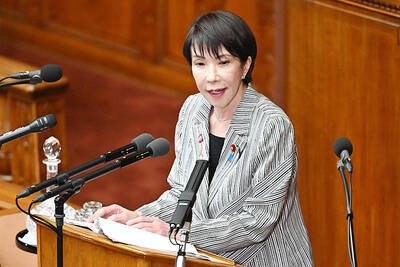Taiwan has been put on equal footing with the US regarding potential trade cooperation by the second round of negotiations under the US-Taiwan Initiative on 21st-Century Trade, Minister Without Portfolio John Deng (鄧振中) said on Tuesday.
Taiwan had previously responded passively regarding trade deals with the US, but the latest four-day round of negotiations, which ended on Tuesday, put the two countries on an equal footing, Deng told a post-meeting news conference in Taipei.
Citing Section 301 of the US’ Trade Act, Deng said that Taiwan had “passed the phase” during which it could be subjected to trade retaliation from the US, which would greatly increase the scope of cooperation.

Photo: CNA
After the meeting, the Office of Trade Negotiations said that top officials from both sides were “satisfied about the negotiation and the results.”
It expects the two sides within a few weeks to sign an early harvest agreement on trade facilitation, anti-corruption, small and medium-sized enterprises (SMEs), good regulatory practices and domestic regulation of services.
The agreement would provide guidance on efforts in those fields, Deng said, adding that hopefully the work would bring greater stability and administrative transparency, and businesses would have a more open channel to voice their opinions.
Deng also expressed hope that effort would be made to improve communication channels between the two sides, and that a dialogue mechanism would be established to discuss the formulation of rules for SMEs and the service industry.
The agreement would establish a permanent communication mechanism between SMEs on both sides, institutionalizing and increasing the frequency of exchanges, Deputy Trade Representative Yang Jen-ni (楊珍妮) said.
Meanwhile, good regulatory practices could be achieved by encouraging greater public participation in policymaking to create a fair environment in which to conduct business and decrease legal compliance costs, which would send a positive message to prospective investors and the international community about doing business in Taiwan, Yang said.
Efforts to achieve this aim would also help bring Taiwan’s rules and regulations more in line with international trends, she said.
Domestic regulation of services stems from good regulatory practice, she said, adding that the government would need to familiarize businesses seeking to expand into the US market with the rules to obtain operating licenses, which would be consistent with its goal of helping Taiwanese businesses internationalize.
Joint efforts would see the two countries jointly establish a paradigm to counter corruption and help remove obstacles stemming from corruption that hamper the overseas operations of Taiwanese businesses, she said.
Objectives laid out during the talks largely conformed to Taiwan’s anti-corruption policy, so the nation would not be significantly burdened by the changes, she added.
The two sides are to finalize at upcoming negotiations details measures to deny safe haven for foreign public servants charged with corruption, Yang said.
The US Trade Representative said in a separate statement that both sides “reached consensus in a number of areas and pledged to maintain an ambitious negotiating schedule in the months ahead to continue this momentum.”
The initiative was launched in June last year in the wake of Taiwan’s exclusion from the Indo-Pacific Economic Framework (IPEF). The first round of physical talks was held in New York on Nov. 8 and 9.
Before the talks, Taiwanese officials said that the nation’s goal is to complete negotiations before the APEC annual meeting slated for later this year.
Roy Lee (李淳), senior deputy executive director at the Chung-Hua Institution for Economic Research, said that topics covered during negotiations are also discussed in free-trade agreements and the results achieved through such talks would be conducive to signing deals with other countries.
Prior to the negotiations with the US, Taiwan had waited more than 20 years for such an opportunity, Lee said.
With the US “vouching” for Taiwan’s readiness to adopt high standards to facilitate trade and good regulatory practices, it would also aid Taiwan’s bid to join the Japan-led Comprehensive and Progressive Agreement for Trans-Pacific Partnership, he said.
Similarly, it could help equip Taiwan with the credentials to participate in the IPEF, even only as an observer, he added.
As a short-term goal, the government could contemplate how to make the merits of the early harvest agreement clear to the business sector by elaborating on the details once they are made public, Lee said.

The Central Weather Administration (CWA) yesterday said it expected to issue a sea warning for Typhoon Fung-Wong tomorrow, which it said would possibly make landfall near central Taiwan. As of 2am yesterday, Fung-Wong was about 1,760km southeast of Oluanpi (鵝鑾鼻), Taiwan’s southernmost point, moving west-northwest at 26kph. It is forecast to reach Luzon in the northern Philippines by tomorrow, the CWA said. After entering the South China Sea, Typhoon Fung-Wong is likely to turn northward toward Taiwan, CWA forecaster Chang Chun-yao (張峻堯) said, adding that it would likely make landfall near central Taiwan. The CWA expects to issue a land

Taiwan’s exports soared to an all-time high of US$61.8 billion last month, surging 49.7 percent from a year earlier, as the global frenzy for artificial intelligence (AI) applications and new consumer electronics powered shipments of high-tech goods, the Ministry of Finance said yesterday. It was the first time exports had exceeded the US$60 billion mark, fueled by the global boom in AI development that has significantly boosted Taiwanese companies across the international supply chain, Department of Statistics Director-General Beatrice Tsai (蔡美娜) told a media briefing. “There is a consensus among major AI players that the upcycle is still in its early stage,”

‘SECRETS’: While saying China would not attack during his presidency, Donald Trump declined to say how Washington would respond if Beijing were to take military action US President Donald Trump said that China would not take military action against Taiwan while he is president, as the Chinese leaders “know the consequences.” Trump made the statement during an interview on CBS’ 60 Minutes program that aired on Sunday, a few days after his meeting with Chinese President Xi Jinping (習近平) in South Korea. “He [Xi] has openly said, and his people have openly said at meetings, ‘we would never do anything while President Trump is president,’ because they know the consequences,” Trump said in the interview. However, he repeatedly declined to say exactly how Washington would respond in

Japanese Prime Minister Sanae Takaichi said yesterday that China using armed force against Taiwan could constitute a "survival-threatening situation" for Japan, allowing the country to mobilize the Japanese armed forces under its security laws. Takaichi made the remarks during a parliamentary session yesterday while responding to a question about whether a "Taiwan contingency" involving a Chinese naval blockade would qualify as a "survival-threatening situation" for Japan, according to a report by Japan’s Asahi Shimbun. "If warships are used and other armed actions are involved, I believe this could constitute a survival- threatening